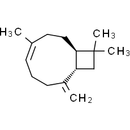Description
β-Caryophyllene is a CB2 receptor agonist.
Product information
CAS Number: 87-44-5
Molecular Weight: 204.35
Formula: C15H24
Synonym:
(-)-(E)-Caryophyllene
(−)-β-caryophyllene
(−)-trans-Caryophyllene
Chemical Name: (1R,4E,9S)-1,9-dihydrogenio-4,11,11-trimethyl-8-methylidenebicyclo[7.2.0]undec-4-ene
Smiles: CC1CC[C@@H]2[C@H](CC2(C)C)C(=C)CCC=1 |c:15|
InChiKey: NPNUFJAVOOONJE-FLFDDASRSA-N
InChi: InChI=1S/C15H24/c1-11-6-5-7-12(2)13-10-15(3,4)14(13)9-8-11/h6,13-14H,2,5,7-10H2,1,3-4H3/b11-6-/t13-,14-/m1/s1
Technical Data
Appearance: Solid Power
Purity: ≥98% (or refer to the Certificate of Analysis)
Solubility: DMSO : < 1 mg/mL (insoluble or slightly soluble). H2O : < 0.1 mg/mL (insoluble).
Shipping Condition: Shipped under ambient temperature as non-hazardous chemical or refer to Certificate of Analysis
Storage Condition: Dry, dark and -20 oC for 1 year or refer to the Certificate of Analysis.
Shelf Life: ≥12 months if stored properly.
Stock Solution Storage: 0 - 4 oC for 1 month or refer to the Certificate of Analysis.
Drug Formulation: To be determined
HS Tariff Code: 382200
How to use
In Vitro:
Among the tested cancer cells, β-Caryophyllene demonstrates selective anti-proliferative effect against three cancer cell lines, namely HCT 116 (colon cancer, IC50=19 μM), PANC-1 (pancreatic cancer, IC50=27 μM), and HT29 (colon cancer, IC50=63 μM) cells, whereas β-Caryophyllene exhibits either moderate or poor cytotoxic effects against ME-180, PC3, K562 and MCF-7. Results show that β-Caryophyllene possesses higher selectivity towards the colorectal cancer cells (HCT 116), with selectivity index (SI)=27.9, followed by PANC-1 and HT 29 cells with SI=19.6 and 8, respectively. The apoptotic index estimated for β-Caryophyllene treatment on HCT 116 cells after 24 h treatment is 64±0.04. β-Caryophyllene at 10 μM concentration, causes significant nuclei condensation after 6 h of treatment. β-caryophyllene exhibits a dose and time-dependent inhibitory effect on the motility of HCT 116 cells.
In Vivo:
Treatment with β-Caryophyllene at different doses does not show any effects on swimming speed during the test. Oral treatment with β-Caryophyllene ameliorates the rise in β-amyloid deposition in the transgenic mice in a roughly dose-dependent manner, and the two higher doses exhibit almost equal effects in modifying the β-amyloid burden. The number of activated astroglial cells is higher in vehicle-treated mouse brains than in β-Caryophyllene-treated mouse brains with different doses. β-Caryophyllene is effective at reducing the enhancement of the COX-2 protein level found in vehicle-treated APP/PS1 mice. Animals treated with β-Caryophyllene display higher values of object recognition index than their vehicle-treated counterparts [t(14)=4.204, P<0.05]. The total time spent in object exploration during the test trial is not significantly different between β-Caryophyllene-treated and vehicle-treated animals (t(14)=0.5874, P>0.05). Treatment with β-Caryophyllene does not significantly alter these seizure-induced neurochemical changes.
References:
- Cheng Y, et al. β-Caryophyllene ameliorates the Alzheimer-like phenotype in APP/PS1 Mice through CB2 receptor activation and the PPARγ pathway. Pharmacology. 2014;94(1-2):1-12.
- Dahham SS, et al. The Anticancer, Antioxidant and Antimicrobial Properties of the Sesquiterpene β-Caryophyllenefrom the Essential Oil of Aquilaria crassna. Molecules. 2015 Jun 26;20(7):11808-29.
- de Oliveira CC, et al. Anticonvulsant activity of β-caryophyllene against pentylenetetrazol-induced seizures. Epilepsy Behav. 2016 Mar;56:26-31.
Products are for research use only. Not for human use.
Payment & Security
Your payment information is processed securely. We do not store credit card details nor have access to your credit card information.


